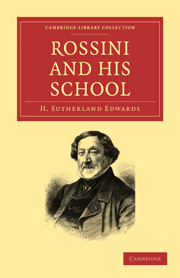Book contents
- Frontmatter
- Contents
- CHAP. I ROSSINI'S CHILDHOOD AND YOUTH
- CHAP. II LA PIETEA DEL PARAGONE
- CHAP. III ITALIAN OPERA UNTIL THE TIME OF ROSSINI
- CHAP. IV TANCREDI
- CHAP. V OPERATIC CUSTOMS IN ROSSINI'S TIME
- CHAP. VI ROSSINI AT NAPLES
- CHAP. VII PREPARATIONS FOR THE BARBER
- CHAP. VIII IL BARBIERE
- CHAP. IX ROSSINI AND THE COMIC IN MUSIC
- CHAP. X FROM OTELLO TO SEMIKAMIDE
- CHAP. XI ROSSINI ON HIS TRAVELS
- CHAP. XII DONIZETTI
- CHAP. XIII VERDI
- LIST OF ROSSINI'S PUBLISHED WORKS
CHAP. IV - TANCREDI
Published online by Cambridge University Press: 29 August 2010
- Frontmatter
- Contents
- CHAP. I ROSSINI'S CHILDHOOD AND YOUTH
- CHAP. II LA PIETEA DEL PARAGONE
- CHAP. III ITALIAN OPERA UNTIL THE TIME OF ROSSINI
- CHAP. IV TANCREDI
- CHAP. V OPERATIC CUSTOMS IN ROSSINI'S TIME
- CHAP. VI ROSSINI AT NAPLES
- CHAP. VII PREPARATIONS FOR THE BARBER
- CHAP. VIII IL BARBIERE
- CHAP. IX ROSSINI AND THE COMIC IN MUSIC
- CHAP. X FROM OTELLO TO SEMIKAMIDE
- CHAP. XI ROSSINI ON HIS TRAVELS
- CHAP. XII DONIZETTI
- CHAP. XIII VERDI
- LIST OF ROSSINI'S PUBLISHED WORKS
Summary
Tancredi, composed a year after La Pietra del Paragone, was Rossini's first serious opera. It was also the first opera by which he became known throughout Europe.
To amateurs of the present day its melodies appear of old-fashioned, or at least of antique cast. The recitatives seem long, and they are interminable compared with those by which Verdi connects his musical pieces. But when Tancredi was first brought out opera seria consisted almost entirely of recitative, relieved here and there and only at long intervals by solo airs. For much of this declamation Rossini substituted singing; for endless monologues and dialogues supported by a few chords, concerted pieces connected and supported by a brilliant orchestral accompaniment.
Rossini, in fact, introduced into serious opera the forms which comic opera already possessed. The parts were at that time differently distributed in opera seria and opera buffa; and in the latter less restricted style the bass singer was not as a matter of course kept in the background. Tancredi was the first serious opera in which a certain prominence was given to the bass, though it was not until some years later—in Otello, 1816, in La Gazza Ladra, 1817, and in Mosè, 1818—that Rossini ventured to entrust bass singers with leading parts. Opera seria, when Rossini was beginning his career, was governed by rules as strict, as formal, and as thoroughly conventional as those which gave so much artificiality and so much dulness to the classical drama of France.
- Type
- Chapter
- Information
- Rossini and his School , pp. 27 - 33Publisher: Cambridge University PressPrint publication year: 2009First published in: 1881



